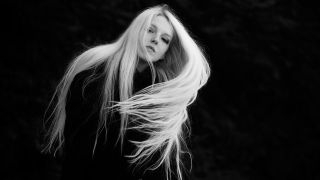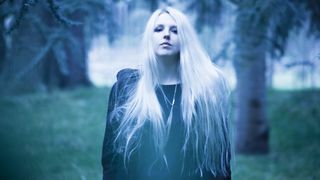Seeking solace and a rooted sense of yourself in art is not unusual, but for Kathrine Shepard, the artist behind Sylvaine, that impulse has taken on a special resonance. Her background is nomadic; having been born in San Diego to an American father and Norwegian mother, the young Kathrine soon moved to Oslo and found her home, yet now finds herself living and creating in Paris.
“I’ve spent most of my life in Norway,” she explains. “I think that’s why I have a special connection with nature because where I lived is five minutes away from the forest and beautiful landscapes, so it became a shelter when I was growing up.”
Recently, though, Sylvaine has made a move to Paris and there’s a sense of loss in the way she speaks of leaving Oslo. There’s a bigger reason to be in France, but it’s not one she’s completely open to talking about. Instead she speaks of feeling lonely, and it’s that theme that filters through her music.
“It’s very different in Paris. The fact nature doesn’t exist here and when you come to a country and you don’t speak the language and you don’t have your friends you start feeling a lot like an outsider. It sounds so dramatic but I feel like I’m kind of alone anyways, and coming to Paris made me feel even more like that.”
That outsider sense is prevalent on second album, Wistful – a much more mature and realised affair than Sylvaine’s 2014 debut, Silent Chamber, Noisy Heart, and one that feels infinitely more melancholic and sorrowful.
“The move to Paris impacted the expression on this album,” she says. “It became darker than I expected. The first time I listened to the whole thing, I was like, ‘Woah, that’s kind of depressing.’ But, it brought out a lot of this longing for something, and the fearing of really not belonging here, to this place, and you can hear that a lot on Wistful.”
For Kathrine, the melding of post-rock and a black metal sound came naturally after discovering Type O Negative at 16 and listening to Peter Steele’s recommendations of ethereal indie pioneers Cocteau Twins and Lush. She was interested in the juxtaposition of heavier distorted guitars in doom/black metal and the pastoral atmosphere of Slowdive, and so the impetus to meld those two styles was borne. In 2012 she was led to Alcest – her favourite band – and Sylvaine was created.
“That’s probably not a shock to anyone,” she laughs. “I connected to the music and even though I haven’t had the kind of experiences that I know Neige [Alcest’s founder] has had, but I knew I could feel something from the music and felt comforted that there was someone else that felt something similar… that’s kind of selfish isn’t it?”
Selfish or not, it’s a relief to know that despite the feelings of isolation, you’re not alone. Music plays a huge part for a lot of people in terms of helping them move on from situations and figuring out their place, and when pressed as to whether making music has helped her to move forward or to realise her reasons for making such big changes in her life, Sylvaine is honest about how art is like therapy.
“Like a lot of artists,” she muses, “I write because there’s something I need to express, when words aren’t enough, but I don’t know if it’s more a temporary solution. You’re relieved when you’ve dealt with it but in the end it’s still there with you, so I think it helps you realise some things about what you’re going through and your feelings and where it’s coming from, but I’m not sure if it offers a lasting solution.”

It seems to offer the sanctuary that she seeks, though, and in talking about her own music and why she chose to imbue her post-rock melodies with blackened moments, she explains: “I’m drawn to the dualism in life; you don’t have happiness without sadness, you don’t have love without hate. It’s not enough to just to have pretty melodies or atmospheres; you have to express the extremes. I use the harsher elements to underline the extremes and my emotional register. That speaks to me.”
In that case, would she consider herself black metal in any sense?
“I’ve seen other people trying to call their music black metal and have a huge backlash, so I’d never claim that my music is black metal. I use some elements, but it’s definitely more post-rock, blackgaze, shoegaze or whatever.”
Comparisons to Alcest will surely come, but she finds it complimentary. She’s glad people are finding the connection and are able to relate and hopes that instead, listeners are drawn to her sincerity. Wistful has a layered complexity and Sylvaine is eloquent in describing the emotions behind the music. Deep down, the album is coloured by the move she made to Paris and the transformations that came with it. But also, there’s a much more spiritual vibration behind it, and it’s one that connects back to her roots and the bond she feels with nature.
“Wistful focuses on how it feels to be stuck inside a body,” she explains. “I call it a human vessel; I see it as the soul is stuck inside and it’s kind of driving humans and it’s restricted by the human senses – which are very limited, in my opinion – and basically some of the emotion comes out of those limitations and feeling that you can’t reach certain things that you could in your more pure state.”
The intangible, otherworldly ideas that she speaks of come to life through the sounds on Wistful and for Sylvaine, and many of her listeners, comfort in moments of solitude will be easier to find thanks to this record. It’s an ethereal, spiritual experience that will stay with you and bring salvation in dark times.
WISTFUL IS OUT NOW VIA SEASON OF MIST RECORDS

